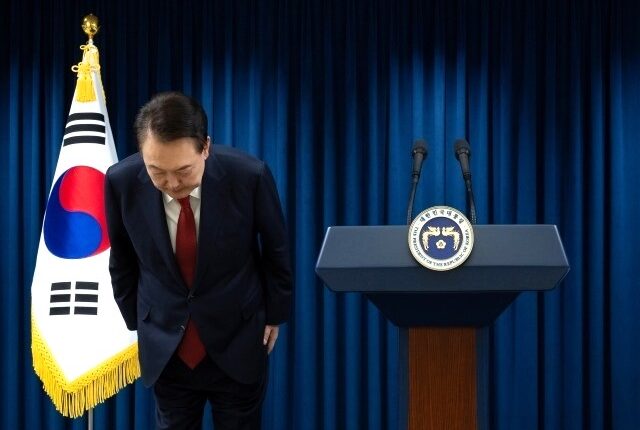Korean President Yoon Suk Yeol: From No-nonsense Prosecutor to Troubled President
Yoon Suk Yeol's journey is marked by rising hopes and deepening crises as he faces mounting calls for accountability and impeachment amid political turmoil.
NEW DELHI/SEOUL: Yoon Suk Yeol, the 13th President of South Korea, has experienced a tumultuous journey since his election in May 2022. Rising from the ranks of public prosecution, Yoon’s ascent to the presidency was marked by promises of integrity and reform. However, his tenure has been overshadowed by political strife, declining approval ratings, and recent controversies that have led to calls for his impeachment. This profile delves into Yoon’s background, political career, and the challenges he faces as he navigates the complexities of leadership in a divided nation.
President Yoon Suk Yeol’s journey from esteemed prosecutor to troubled leader illustrates the complexities of navigating South Korea’s political landscape. As he grapples with declining approval ratings, internal dissent within his party, and mounting pressure for accountability, Yoon faces a pivotal moment in his presidency. The coming months will be crucial in determining whether he can regain public trust or if he will become another chapter in South Korea’s tumultuous political history. With calls for impeachment looming large, Yoon must confront both external challenges and internal divisions if he hopes to steer his administration back on course.
Early Life and Career: Born on December 18, 1960, in Seoul, Yoon graduated from Seoul National University with degrees in law. He began his career as a prosecutor in 1994, quickly gaining recognition for his role in high-profile corruption cases. Notably, he was instrumental in convicting former Presidents Park Geun-hye and Lee Myung-bak for abuse of power. His reputation as a no-nonsense prosecutor who tackled corruption head-on positioned him as a formidable figure in South Korean politics.
Yoon’s rise culminated in his appointment as Prosecutor General in 2019 under President Moon Jae-in. However, his tenure was marked by clashes with the Moon administration over judicial independence and prosecutorial reforms. These tensions ultimately led to his resignation in March 2021 and paved the way for his entry into politics as a candidate for the conservative People Power Party (PPP).
Presidency and Political Challenges: Yoon’s presidential campaign focused on economic liberalization and a hardline stance on North Korea. He narrowly won the election on March 9, 2022, securing 48.56% of the vote against Democratic Party candidate Lee Jae-myung’s 47.83%, marking one of the closest elections in South Korean history. His inauguration on May 10 heralded hopes for a new era; however, Yoon faced immediate challenges from an opposition-controlled National Assembly that has made it difficult for him to pass key legislation.
Since taking office, Yoon’s approval ratings have plummeted due to rising inflation and unpopular policy proposals. His attempts to increase the standard workweek from 52 to 69 hours and controversial educational reforms faced significant backlash from both the public and lawmakers. By July 2022, his approval rating had dipped below 30%, reflecting widespread dissatisfaction with his administration.
Controversies surrounding the First Day: The controversies surrounding Kim Keon-hee, the First Lady of South Korea and wife of President Yoon Suk Yeol, have significantly impacted the political landscape and public perception of the presidential couple. Kim has faced multiple allegations, including accepting a luxury Dior handbag from a pastor, which violated South Korean laws prohibiting public officials from receiving gifts exceeding a certain value. This incident sparked outrage and was captured on hidden camera footage, leading to accusations of corruption. Additionally, Kim has been embroiled in allegations of stock price manipulation related to her involvement with Deutsch Motors, further complicating her public image.
Other controversies include claims of resume falsification and academic plagiarism, which have prompted calls for investigations into her conduct. President Yoon has publicly apologized for the controversies surrounding his wife while rejecting calls for a special counsel investigation, asserting that many accusations are exaggerated and politically motivated. However, these ongoing scandals have contributed to a significant decline in Yoon’s approval ratings and have fuelled discussions about potential impeachment proceedings against him.
Recent Controversies: The situation escalated dramatically when Yoon declared emergency martial law on December 3, 2024, accusing opposition parties of sympathizing with North Korea and paralyzing government operations. This unprecedented move sparked outrage across the nation, leading to protests and calls for his resignation. Opposition leader Lee Jae-myung labeled the declaration “illegal and unconstitutional,” further polarizing an already divided political landscape.
Yoon’s administration has been plagued by scandals involving family members and associates, which have compounded public disillusionment. The combination of these controversies has prompted discussions about potential impeachment proceedings against him.
Public Sentiment: The mood among South Koreans has shifted significantly since Yoon took office. Once viewed as a beacon of hope for reform and integrity, he is now seen by many as a leader struggling to maintain control amid growing unrest. Even some of his former supporters express disappointment over his handling of critical issues.
The recent martial law incident has intensified scrutiny over Yoon’s leadership style and decision-making processes. Many citizens fear that such authoritarian measures threaten democratic values in South Korea, leading to increased activism among opposition groups and civil society organizations advocating for accountability.


